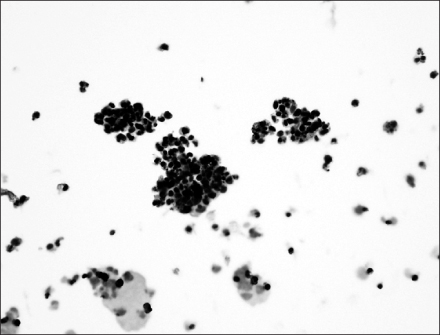Tuberc Respir Dis.
2009 Dec;67(6):574-576.
Newly Developed Weakness of Lower Extremities Despite Improved Brain Metastasis of Lung Cancer after Radiotherapy
- Affiliations
-
- 1Department of Internal Medicine, Korea Cancer Center Hospital, Seoul, Korea. jclee@kcch.re.kr
- 2Department of Pathology, Korea Cancer Center Hospital, Seoul, Korea.
- 3Department of Radiology, Korea Cancer Center Hospital, Seoul, Korea.
Abstract
- An intramedullary spinal cord metastasis (ISCM) rarely develops in systemic cancer but is indicative of a poor prognosis. A 56-year-old man was admitted due to weakness of the lower extremities. He had received radiotherapy 3 months prior for a brain metastasis that had developed 1 year after achieving a complete response from chemotherapy for extended stage small cell lung cancer. Although the brain lesion had improved partially, ISCM from the cervical to lumbar-sacral spinal cords, which was accompanied by a leptomeningeal dissemination, was diagnosed based on magnetic resonance imaging of the spine and cerebrospinal fluid cytology. Finally, he died of sudden cardiac arrest during treatment. This is the first case of ISCM involving the whole spinal segments. Physicians should be aware of the subsequent development of ISCM in lung cancer patients with a previously known brain metastasis who present with new neurological symptoms.
MeSH Terms
Figure
Reference
-
1. Chason JL, Walker FB, Landers JW. Metastatic carcinoma in the central nervous system and dorsal root ganglia: a prospective autopsy study. Cancer. 1963. 16:781–787.2. Moffie D, Stefanko SZ. Intramedullary metastasis. Clin Neurol Neurosurg. 1980. 82:199–202.3. Grem JL, Burgess J, Trump DL. Clinical features and natural history of intramedullary spinal cord metastasis. Cancer. 1985. 56:2305–2314.4. Okamoto H, Shinkai T, Matsuno Y, Saijo N. Intradural parenchymal involvement in the spinal subarachnoid space associated with primary lung cancer. Cancer. 1993. 72:2583–2588.5. Potti A, Abdel-Raheem M, Levitt R, Schell DA, Mehdi SA. Intramedullary spinal cord metastases (ISCM) and non-small cell lung carcinoma (NSCLC): clinical patterns, diagnosis and therapeutic considerations. Lung Cancer. 2001. 31:319–323.6. Costigan DA, Winkelman MD. Intramedullary spinal cord metastasis: a clinicopathological study of 13 cases. J Neurosurg. 1985. 62:227–233.7. Kalayci M, Cağavi F, Gül S, Yenidünya S, Açikgöz B. Intramedullary spinal cord metastases: diagnosis and treatment - an illustrated review. Acta Neurochir (Wien). 2004. 146:1347–1354. discussion 1354.8. Grem JL, Burgess J, Trump DL. Clinical features and natural history of intramedullary spinal cord metastasis. Cancer. 1985. 56:2305–2314.9. Weissman DE, Grossman SA. Simultaneous leptomeningeal and intramedullary spinal metastases in small cell lung carcinoma. Med Pediatr Oncol. 1986. 14:54–56.10. Wasserstrom WR, Glass JP, Posner JB. Diagnosis and treatment of leptomeningeal metastases from solid tumors: experience with 90 patients. Cancer. 1982. 49:759–772.
- Full Text Links
- Actions
-
Cited
- CITED
-
- Close
- Share
- Similar articles
-
- A Man Presenting with Sudden Weakness and Pain of the Right Hand, by Non-Small Cell Lung Cancer with Brain Metastases
- Cavernous Sinus Metastasis of Non-Small Cell Lung Cancer
- Stereotactic Body Radiotherapy for Early Stage Lung Cancer
- Radiotherapy of Brain Metastases from Lung Cancer
- Treatment Outcome of Brain Metastasis after the Cranial Radiotherapy Followed by Fractionated Stereotactic Radiotherapy and Its Prognostic Factors




